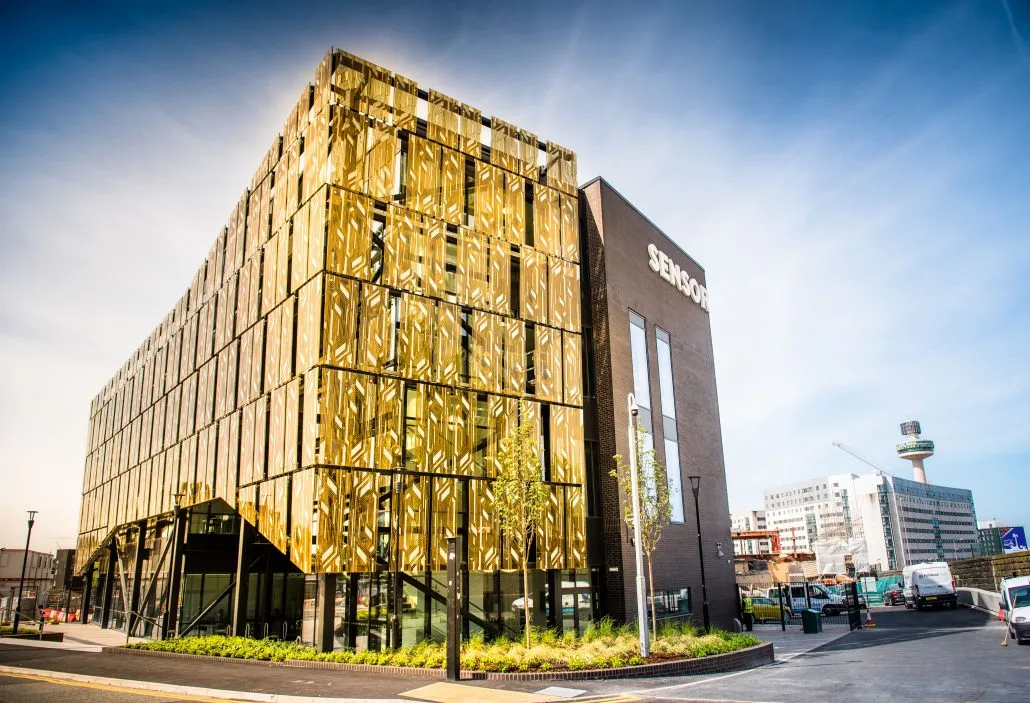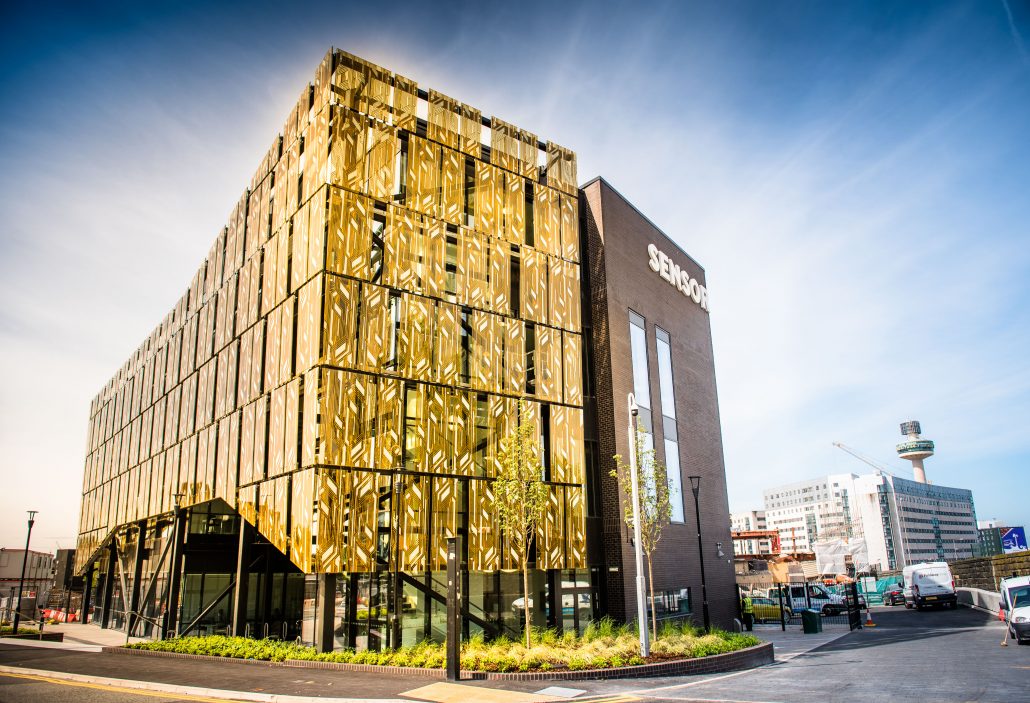The senselessness of Sensor City

There were supposed to be 300 companies and 1000 new jobs. What happened?
Dear members — on Russell Street near Liverpool’s Paddington Village, sits a shiny gold building you’ve probably walked past. It’s called Sensor City, and it arrived to much fanfare a few years back, with a promise to deliver 300 new companies and 1000 new jobs. But within a few short years the building was empty and most of its staff made redundant. The development company Sciontec are now taking over and have plans to revive it, but we took a close look at what went wrong, and what lessons might be learned.
As ever on a Friday, today’s edition is exclusively members-only. That means those on our free list will be able to dip their toes into the tale of Sensor City, but no more. If you want to submerge yourself fully, the solution is obvious: to commit to the price of £7 a month (or £65 a year) and sign up as a member of The Post, joining the 850 or so who already have. For that, you’ll get all of our editions directly sent to your inbox, including investigations, cultural treats and long-reads from the very best writers in the region. Our mission is to bring back the kind of high-quality journalism Merseyside deserves — and it would be great to have you on board.
Your Post briefing
Liverpool Community Independents leader Anna Rothery has been suspended from her party in the wake of the parking ticket scandal enveloping the council. The Echo’s 16-month investigation into 14 councillors who used “back door” methods to have parking fines quashed has caused ripples through local politics. Alongside Rothery’s suspension, Joanne Calvert — also of the LCIs and former mayor Joe Anderson’s daughter — has stepped down from the group. Rothery offered an apology for the incident last night on Twitter: “I am truly sorry for an error of judgement I made over a parking fine. On receiving the fine, I sought advice and was told that because I was on council business when I received it, it would be rescinded, and my offer to pay was twice rejected.” The suspension will put pressure on the Liverpool Labour Party given they have many politicians named in the scandal, including former deputy mayor Ann O’Byrne, who had 17 tickets cancelled. Rothery, by comparison, only had one. Liverpool Labour is said to be investigating the matter internally.
The Labour Party cruised to an easy victory in the West Lancashire by-election. The result saw a 10.5% swing towards Labour’s Ashley Dalton, who is replacing Rosie Cooper after she stood down from the party after 17 years. The result was little surprise, Labour have held the seat since 1992, and its winning majority — 8,326 — is similar to the result they achieved in 2019’s general election, but their share of the vote increased from 52.1% to 62.3%. The victory — which follows two recent by-election holds for Labour in north-west England — indicates that the Tories have “run out of road,” according to shadow chancellor Rachel Reeves.
A spreadsheet containing the salaries of 14,000 staff at Liverpool University Hospitals “has been mistakenly emailed to hundreds of managers,” reports Health Service Bureau journalist Lawrence Dunhill. The data was contained within an email concerning arrangements for industrial action, leaking personal information of staff; such as addresses, national insurance numbers and salaries. The breach has sparked an external investigation and has been referred to the Information Commissioner's Office.
Post Picks
🎭 At West Kirby Arts Centre on Sunday, a show that merges “dream-like symbolic visuals, physical theatre, puppetry and live music.” Think me in Circles tells the story of a mother coming to terms with the suicide of her adult daughter and has won multiple five star reviews. Tickets are pay-what-you-can.
🎶 Mandolin, cellos, banjos, guitars and vocals courtesy of Woodland Studios, who are performing live at Tribe 432 tomorrow night. The music will be served up with cacao from an organic plant based deli. Tickets running low.
🗣️ The South Liverpool Debating Society will be doing what they do best next Thursday: debating! The motion this time evokes the old men are from mars women are from venus adage: This House Believes that Women are Kinder than Men. Agree? Disagree? Straddling the fence? Head to Keith’s Wine Bar at 7pm to get stuck in.
After World War II had finished and the military forces of the northern hemisphere had departed from various far flung corners of the globe, strange behaviours began to take hold of native tribes in the South Pacific.
Having had contact with more technologically advanced cultures during the war, they began to try and imitate those cultures, believing that doing so would yield similar material wealth and advancement. They cut landing strips out of the jungle, built mock aircraft and mock radios and waved landing signals while standing on their runways. They became known as “cargo cults,” and the would-be ‘cult’ members believed the foreigners had a special connection to the deities who were in turn delivering them riches. Even today, certain tribes in Vanuatu are still praying to DC-3 cargo plane-shaped idols.
The cargo cult metaphor in science, I probably ought to note, is not my metaphor. It was first used by the American theoretical physicist Richard Feynman in 1974, but is now used widely in scientific communities to describe a “superficial imitation of a process without basic understanding of its mechanism”. It’s a reaching out towards a lofty — and often well-meaning — goal which it is doomed to never grasp. Which brings us to Sensor City, Liverpool’s shining gold-enamelled tech hub, which sits on Russell Street near Paddington Village, basking in the glow of the sun. Not many people know its backstory.
In the early days of David Cameron’s Conservative government, the Prime Minister announced a new policy: University Enterprise Zones (UEZs). These would essentially be incubators which would utilise the knowledge of universities in order to help grow tech and innovation businesses. Cameron had lofty ambitions for the project: “I want to see University Enterprise Zones help create the next Yahoo or the next Microsoft,” he said. He also hoped to challenge the “Ivory Tower” conception of universities, in which academics are considered detached figures whose work lacks real-world impact. Areas could bid for funding to start an UEZ. In 2014, the University of Liverpool and Liverpool John Moores University did so in collaboration.
The whole point was to harness the expertise and research capabilities of the two universities and convert that into real companies and, therefore, money. They took their initial funding, committed £5 million each themselves, and spent the money on the building we know as Sensor City, complete with a £500,000 enamelled glass architectural facade crafted by the well-known enamelled glass facade-maker Julian Stocks. It wanted to make a real impact: its aim was to create 300 new businesses and 1000 jobs.

But that was where the fun stopped. After the new £10 million building was completed, a valuation was carried out. It was worth £2.2 million. “This valuation is below cost [...] resulting in a £7,701,102 charge” says the accounts. Four years after that, by which point the wheels had mostly come off and the building was entirely empty, it was valued at £430k (less than the glass facade). Despite this, if you look it up online, you’ll struggle to find anything but good news. How, and why, has this happened?
Liverpool deserves great journalism. You can help make it happen.
You're halfway there, the rest of the story is behind this paywall. Join the Post for full access to local news that matters, just £7/month.
SubscribeAlready have an account? Sign In

Latest
Rent hikes, VHS tapes and a controversial screening of Jaws: Inside the fight over Toxteth TV
Is Liverpool resting on its laurels?
From Hoylake to St Helens, community cinema is making a comeback
Millions of tonnes of greenhouse gas to be piped under Liverpool Bay
The senselessness of Sensor City
There were supposed to be 300 companies and 1000 new jobs. What happened?